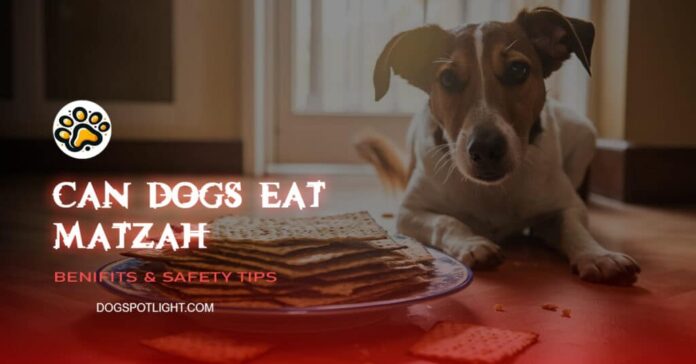As Passover approaches, many dog owners wonder: can dogs eat matzah? The short answer is yes, dogs can eat plain matzah in moderation, but there are important considerations to keep in mind before sharing this unleavened bread with your furry friend.
Understanding Matzah and Its Safety for Dogs
Matzah the unleavened bread traditionally eaten during Passover is essentially made from flour and water. While it’s not toxic to dogs, it’s important to understand both the benefits and potential risks before feeding it to your canine companion.
If you’re looking for more comprehensive information about dog nutrition and safe foods, check out our dog care guides for expert advice.
Benefits and Risks of Feeding Matzah to Dogs
Potential Benefits:
- Low in fat
- Simple ingredients
- Easy to digest in small amounts
- Can be a safe occasional treat
Possible Risks:
-
High in Carbohydrates
- May contribute to weight gain
- Not suitable for diabetic dogs
- Could cause blood sugar spikes
-
Digestive Issues
- Too much can cause constipation
- May lead to stomach upset
- Could cause bloating
Guidelines for Feeding Matzah to Your Dog
Do’s:
- Offer plain, unsalted matzah only
- Break into small, manageable pieces
- Monitor your dog’s reaction
- Serve as an occasional treat
Don’ts:
- Avoid flavored or egg matzah
- Don’t feed matzah with spreads or toppings
- Never give chocolate-covered matzah
- Don’t make it a regular part of their diet
Special Considerations
Pet like boss recommends being extra cautious when introducing any new food to your dog’s diet. Some dogs may have wheat sensitivities or gluten intolerance, making matzah an unsuitable treat.
Signs of Adverse Reactions:
- Vomiting
- Diarrhea
- Excessive thirst
- Lethargy
- Allergic reactions
Alternatives to Matzah for Dogs
If you’re celebrating Passover and want to include your furry friend consider these safer alternatives
-
Dog-Specific Passover Treats
- Kosher dog treats
- Plain cooked meat
- Dog-safe vegetables
-
Homemade Options
- Plain boiled chicken
- Carrots
- Sweet potato chunks
Making Passover Safe for Your Dog
Remember that while dogs can eat matzah, it’s essential to keep all holiday foods and decorations secure. Many traditional Passover foods can be harmful to dogs, including:
- Chocolate
- Nuts
- Grapes and raisins
- Onions and garlic
- Wine and grape juice
Expert Tips for a Pet-Safe Passover
-
Create a Safe Space
- Set up a quiet area for your dog
- Keep food out of reach
- Maintain regular feeding schedules
-
Guest Management
- Inform visitors about pet rules
- Watch for dropped food
- Monitor treat-giving
-
Emergency Preparedness
- Keep vet contact info handy
- Know emergency clinic locations
- Watch for signs of distress
So, can dogs eat matzah? While it’s technically safe in small amounts, it’s not the most nutritious treat for your furry friend. If you choose to share matzah with your dog during Passover, remember these key points:
- Moderation is crucial
- Plain matzah only
- Monitor for adverse reactions
- Consider healthier alternatives
Remember that every dog is different, and what works for one may not work for another. When in doubt, always consult with your veterinarian before introducing new foods to your dog’s diet.
FAQs About Dogs and Matzah
How much matzah can I give my dog?
A small piece (about 1-inch square) is sufficient as an occasional treat.
What if my dog ate flavored matzah?
Monitor them for signs of distress and contact your vet if concerns arise.
Can puppies eat matzah?
It’s best to avoid giving matzah to puppies, as their digestive systems are more sensitive.
Is egg matzah safe for dogs?
Plain egg matzah isn’t toxic but could cause digestive upset due to added ingredients.
What should I do if my dog eats too much matzah?
Watch for signs of discomfort and ensure fresh water is available. Contact your vet if symptoms develop.
By following these guidelines and using common sense, you can safely navigate Passover celebrations with your furry family member. Remember that your dog’s health and safety should always come first, even during special occasions and holidays.












